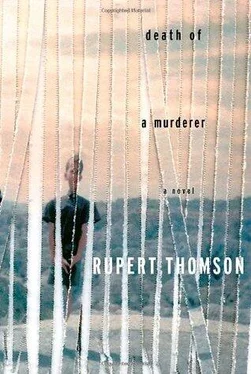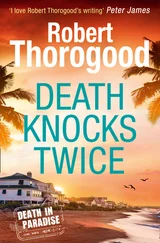“It’s not that you’re stupid exactly,” Newman said.
To the west, the sky was streaked with violet and gold. Summer nights — the way the light never seems to go…
“It’s just that you lack drive.”
Billy watched as a car came into view further down the road.
“You’d rather avoid things,” Newman said, “than really take them on.”
When the car pulled up level with the house, Billy saw that it belonged to one of Sue’s friends from the school gates.
“You’re frightened,” Newman said.
Above the car’s roof was a row of trees, arranged along the horizon. Billy knew that they were poplars, and that they grew in the field beyond the railway line, but in the slowly fading light they looked like an ancient curse written in a language he could not decipher. They had the same qualities as Newman’s words: spiteful, insidious — black as the wrong kind of magic.
The car door opened, and Sue got out with Emma in her arms. Emma’s legs hung straight down, which meant she was probably asleep. Sue glanced at her father’s car, then turned back and watched her friend drive off, freeing one hand so she could wave. She hadn’t noticed Billy in the window, and somehow he felt she ought to have done. That lack of awareness, that apparent self-sufficiency didn’t say much for their relationship — or rather, it said everything.
“What do you think, Scruffy?” came Newman’s voice. “Do you think that’s unfair?”
Billy stood up suddenly and walked down to the far end of the mortuary. He would have liked some air, a change of scene, but it was still hours until his break. Newman’s voice had been so gentle and considered, as if he were dispensing valuable advice, each sentence carefully shaped and weighted so as to lodge in Billy’s memory. Billy rubbed at his face with both hands. Had he avoided things? He didn’t think he had. Sue had wanted security, and he had done his utmost to provide it. He had worked unceasingly to try and build a life that seemed worth living, and now, after fourteen years together, they had more or less everything they were supposed to have — a house, a child, a car, a job, a pension — but nothing felt secure at all, and nothing felt quite real either.
In the last few months he had stopped going straight home after work. The first time it happened, in February, it had been an accident. He knew the roundabout well — he used it most days — so there was no reason why he should have taken the first exit instead of the second, and even once he’d made the mistake he could easily have pulled into the side of the road and turned round. But he didn’t. He carried on. And there was a distinct lightness about the way he drove after that, a detached quality, as though the decision was not only one that had been made for him, but also one that he didn’t have the power either to challenge or to overturn. He wondered if that was how his father, Glenn Tyler, had felt when he walked out on his pregnant wife in 1956. That lightness, that detachment. Things shaken off — for ever, in his father’s case.
From that day on, even after his transfer to Stowmarket had come through, Billy would go back to that same roundabout, and he would follow the road that curved under the Orwell bridge and out along the river. He would always park in the same lay-by. If it was raining, he would listen to the radio, or read the local paper. From time to time, he would switch the wipers on and peer through the windscreen, but there was nothing much to see, just the dark twist of the road ahead of him, and the grass verge to his left and, beyond that, the river’s dull grey surface. If the weather was fine, though, and the tide was out, he would walk across the mud-flats, eyes lowered, as if searching the ground for something he had lost. He only engaged with what lay directly in front of him — seaweed, nails, bones, feathers, shells. The rest of his life he was able, for a while, to keep at bay. He saw all sorts of people. Lonely types mostly. There was a man who carried a white bucket and a long stick with a spoon taped to the end of it. Employed by a nearby farm, he had taken it upon himself to poison the rats that were breeding on the riverbank. There was also a man who dug up ragworms and razorfish, which he would use as bait. Like most keen fishermen, he didn’t have too much to say. And there was a frizzy-haired woman who fed the swans — with biscuits, usually, or stale buns. Another woman, older, would stare out over the water, one hand pressed against her collarbone, as if waiting for a lover to arrive by boat. They would exchange a few words, or nod at each other, but that was about it. Nobody came down to the estuary to make new friends. Sometimes he would read the notice that had been erected on the grass verge. He learned about the various birds that visited the area — the godwit, the redshank, the dunlin. They would spend the summer in Norway or Greenland or Russia, and then, when the temperature began to drop, they would fly south. Those names, though: they sounded like characters from myth or legend. Redshank the warrior, soaked in blood. Godwit the jester, the holy fool…And beyond the notice, of course, there was always the view. There were two cargo ships moored against the far bank, their hulls rusted ginger and listing in the water. There were yachts too, tacking upriver, their sails paunchy with the wind. Behind them lay the Nacton foreshore, where people often went to have sex or smoke dope, and away to his left, the bridge itself, its giant concrete span so high that it looked precarious, almost unsafe. Only the westbound lane was visible from where he stood, the cars and lorries sliding endlessly and steadily from right to left like targets in a fairground rifle-range. Above all, though, there was a sudden immense resource of space and light. It had sufficient power to absorb him, he felt. It was something he could vanish into if he wanted, and that notion gave him solace, making it possible for him, after a while, to turn his car round and drive back home.
Billy sat down again, then leaned forwards, the points of his elbows on his knees. Placing the palms of his hands on his forehead, with his fingers reaching up into his hair, he stared down at the metal grating that covered the drain. He was aware of the pulse beating on the inside of his right wrist. Years ago, when he was sixteen or seventeen, he had imagined all kinds of scenarios, but never anything so obvious or so difficult. He had met people here and there, people who could make things happen. Somehow none of it had quite come off. Life could surge away from you at great speed, leaving you bobbing dumbly in its wake. His friend, Raymond Percival, for instance, who had tried to persuade him to move down south, to London. We could get a squat. Go on the dole. There’ll be parties, girls… Raymond who always said he wanted to be an arms dealer — where was Raymond now? And what about Venetia? He would have married her in two seconds flat, but marriage had been the last thing on her mind. Venetia with her hair flowing over her shoulders, like black treacle poured out of a tin…
He last saw Raymond in Cheshire. It was October 1993, and he had driven up to the north-west to visit his mother who’d just celebrated her sixty-eighth birthday. Sue was three months pregnant with Emma, and Billy’s father, Glenn Tyler, had died a few weeks earlier, in Germany. It was a strange time, full of events that were enormous but concealed, remote. He found it hard to work out what he was feeling. He just kept going, without thinking too much, and tried to do the ordinary things as efficiently as he could. On the Saturday night he took his mother out to dinner in a country pub where the food was supposed to be good, and as he went up to the bar for the second time, to fetch more drinks, somebody called his name. He glanced over his shoulder, and there, unbelievably, was Raymond Percival, sitting at a candlelit table with a girl.
Читать дальше












